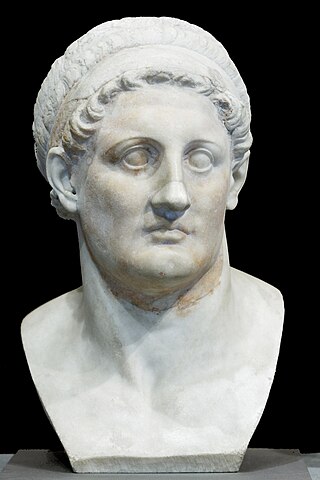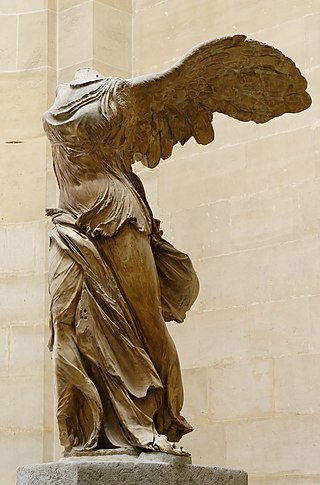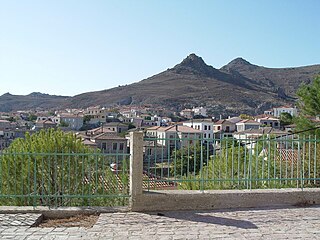Other uses
- Hellenic Football League, English football league
Hellenic League may refer to:

Abydos was an ancient city and bishopric in Mysia. It was located at the Nara Burnu promontory on the Asian coast of the Hellespont, opposite the ancient city of Sestos, and near the city of Çanakkale in Turkey. Abydos was founded in c. 670 BC at the most narrow point in the straits, and thus was one of the main crossing points between Europe and Asia, until its replacement by the crossing between Lampsacus and Kallipolis in the 13th century, and the abandonment of Abydos in the early 14th century.

The Antigonid dynasty was a Macedonian Greek royal house which ruled the kingdom of Macedon during the Hellenistic period. Founded by Antigonus I Monophthalmus, a general and successor of Alexander the Great, the dynasty first came to power after the Battle of Salamis in 306 BC and ruled much of Hellenistic Greece from 294 until their defeat at the Battle of Pydna in 168 BC, after which Macedon came under the control of the Roman Republic.

The 4th century BC started the first day of 400 BC and ended the last day of 301 BC. It is considered part of the Classical era, epoch, or historical period.
This article concerns the period 229 BC – 220 BC.

Macedonia, also called Macedon, was an ancient kingdom on the periphery of Archaic and Classical Greece, which later became the dominant state of Hellenistic Greece. The kingdom was founded and initially ruled by the royal Argead dynasty, which was followed by the Antipatrid and Antigonid dynasties. Home to the ancient Macedonians, the earliest kingdom was centered on the northeastern part of the Greek peninsula, and bordered by Epirus to the southwest, Illyria to the northwest, Paeonia to the north, Thrace to the east and Thessaly to the south.

Miletus was an ancient Greek city on the western coast of Anatolia, near the mouth of the Maeander River in ancient Ionia. Its ruins are located near the modern village of Balat in Aydın Province, Turkey. Before the Persian rule that started in the 6th century BC, Miletus was considered among the greatest and wealthiest of Greek cities.

Ptolemy I Soter was a Macedonian Greek general, historian, and successor of Alexander the Great who went on to found the Ptolemaic Kingdom centered on Egypt. Ptolemy was basileus and pharaoh of Ptolemaic Egypt from 305/304 BC to his death in 282 BC, and his descendants continued to rule Egypt until 30 BC. During their rule, Egypt became a thriving bastion of Hellenistic civilization and Alexandria a great seat of Greek culture.

Antigonus I Monophthalmus was a Macedonian Greek general and successor of Alexander the Great. A prominent military leader in Alexander's army, he went on to control large parts of Alexander's former empire. He assumed the title of basileus (king) in 306 BC and reigned until his death. He was the founder of the Antigonid dynasty, which ruled over Macedonia until its conquest by the Roman Republic in 168 BC.

The League of Corinth, also referred to as the Hellenic League, was a federation of Greek states created by Philip II in 338–337 BC. The League was created in order to unify Greek military forces under Macedonian leadership (hegemony) in their combined conquest of the Persian Achaemenid Empire.

In classical antiquity, the Hellenistic period covers the time in Greek history after Classical Greece, between the death of Alexander the Great in 323 BC and the death of Cleopatra VII in 30 BC, which was followed by the ascendancy of the Roman Empire, as signified by the Battle of Actium in 31 BC and the Roman conquest of Ptolemaic Egypt the following year, which eliminated the last major Hellenistic kingdom. Its name stems from the Ancient Greek word Hellas, which was gradually recognized as the name for Greece, from which the early modern 19th century historiographical term Hellenistic was derived. The term "Hellenistic" is to be distinguished from "Hellenic" in that the latter refers to Greece itself, while the former encompasses all the ancient territories of the period that had come under significant Greek influence, particularly the Hellenized Middle East, after the conquests of Alexander the Great.

Hellenistic Greece is the historical period of Ancient Greece following Classical Greece and between the death of Alexander the Great in 323 BC and the annexation of the classical Greek Achaean League heartlands by the Roman Republic. This culminated at the Battle of Corinth in 146 BC, a crushing Roman victory in the Peloponnese that led to the destruction of Corinth and ushered in the period of Roman Greece. Hellenistic Greece's definitive end was with the Battle of Actium in 31 BC, when the future emperor Augustus defeated Greek Ptolemaic queen Cleopatra VII and Mark Antony, the next year taking over Alexandria, the last great center of Hellenistic Greece.

The Wars of the Diadochi or Wars of Alexander's Successors were a series of conflicts fought between the generals of Alexander the Great, known as the Diadochi, over who would rule his empire following his death. The fighting occurred between 322 and 281 BC.

The Lamian War, or the Hellenic War, was an unsuccessful attempt by Athens and a large coalition of Greek states to end the hegemony of Macedonia over Greece just after the death of Alexander the Great. It was the last time Athens played a significant role as an independent power.

The ancient history of Cyprus shows a precocious sophistication in the Neolithic era visible in settlements such as at Choirokoitia dating from the 9th millennium BC, and at Kalavassos from about 7500 BC.

Eresos and its twin beach village Skala Eresou are located in the southwest part of the Greek island of Lesbos. They are villages visited by considerable numbers of tourists. From 1999 until 2010, Eresos and the village of Antissa constituted the municipality of Eresos-Antissa. From 2010 until 2019, Eresos was part of the municipality of Lesvos and from 2019 it is part of the municipality of West Lesvos.
The Battle of Thermopylae was a battle fought in 480 BC during the Persian Wars.
The history of Anatolia can be roughly subdivided into: Prehistory of Anatolia, Ancient Anatolia, Classical Anatolia, Byzantine Anatolia, Ottoman Anatolia and the Modern Anatolia, since the creation of the Republic of Turkey.

Classical Greece was a period of around 200 years in ancient Greece, marked by much of the eastern Aegean and northern regions of Greek culture gaining increased autonomy from the Persian Empire; the peak flourishing of democratic Athens; the First and Second Peloponnesian Wars; the Spartan and then Theban hegemonies; and the expansion of Macedonia under Philip II. Much of the early defining mathematics, science, artistic thought, theatre, literature, philosophy, and politics of Western civilization derives from this period of Greek history, which had a powerful influence on the later Roman Empire. Part of the broader era of classical antiquity, the classical Greek era ended after Philip II's unification of most of the Greek world against the common enemy of the Persian Empire, which was conquered within 13 years during the wars of Alexander the Great, Philip's son.

The kingdom of Macedonia was an ancient state in what is now the Macedonian region of northern Greece, founded in the mid-7th century BC during the period of Archaic Greece and lasting until the mid-2nd century BC. Led first by the Argead dynasty of kings, Macedonia became a vassal state of the Achaemenid Empire of ancient Persia during the reigns of Amyntas I of Macedon and his son Alexander I of Macedon. The period of Achaemenid Macedonia came to an end in roughly 479 BC with the ultimate Greek victory against the second Persian invasion of Greece led by Xerxes I and the withdrawal of Persian forces from the European mainland.
The siege of Megalopolis was a siege battle during the Second War of the Diadochi between Polyperchon, the Regent of the Macedonian Empire, and the people of Megalopolis who supported Polyperchon's rival Cassander. The siege failed and Polyperchon lost a lot of prestige, which was capitalized on by Cassander and his ally Antigonus.